|
|
|
ADVERTISEMENTS
|
|
PREMIUM
- HAPPY HOLIDAYS!
- Siliconeer Mobile App - Download Now
- Siliconeer - Multimedia Magazine - email-Subscription
- Avex Funding: Home Loans
- Comcast Xfinity Triple Play Voice - Internet - TV
- AKSHAY PATRA - Bay Area Event - Sat. Dec 6
- Calcoast Mortgage - Home Loans
- New Homes in Silicon Valley: City Ventures - Loden Place - Morgan Hill
- Bombay to Goa Restaurant, Sunnyvale
- Buying, Sellling Real Estate in Fremont, SF Bay Area, CA - Happy Living 4U - Realtor Ashok K. Gupta & Vijay Shah
- Sunnyvale Hindu Temple: December Events
- ARYA Global Cuisine, Cupertino - New Year's Eve Party - Belly Dancing and more
- Bhindi Jewellers - ROLEX
- Dadi Pariwar USA Foundation - Chappan Bhog - Sunnyvale Temple - Nov 16, 2014 - 1 PM
- India Chaat Cuisine, Sunnyvale
- Matrix Insurance Agency: Obamacare - New Healthcare Insurance Policies, Visitors Insurance and more
- New India Bazar: Groceries: Special Sale
- The Chugh Firm - Attorneys and CPAs
- California Temple Schedules
- Christ Church of India - Mela - Bharath to the Bay
- Taste of India - Fremont
- MILAN Indian Cuisine & Milan Sweet Center, Milpitas
- Shiva's Restaurant, Mountain View
- Indian Holiday Options: Vacation in India
- Sakoon Restaurant, Mountain View
- Bombay Garden Restaurants, SF Bay Area
- Law Offices of Mahesh Bajoria - Labor Law
- Sri Venkatesh Bhavan - Pleasanton - South Indian Food
- Alam Accountancy Corporation - Business & Tax Services
- Chaat Paradise, Mountain View & Fremont
- Chaat House, Fremont & Sunnyvale
- Balaji Temple - December Events
- God's Love
- Kids Castle, Newark Fremont: NEW COUPONS
- Pani Puri Company, Santa Clara
- Pandit Parashar (Astrologer)
- Acharya Krishna Kumar Pandey
- Astrologer Mahendra Swamy
- Raj Palace, San Jose: Six Dollars - 10 Samosas
CLASSIFIEDS
MULTIMEDIA VIDEO
|
|
|
|
|
NEWS DIARY
Pakistan Mourns as Probe into Air Crash Continues
Train Crash in India Kills More Than 60
Cheetah Will Run Again in India
India's Parliament Paralyzed by Inflation Protests
$1.1B Hawk Deal
Bangladesh Ahead
Fonseka: New Trial
Nepal: Gay Pride
Wage Hike
Reconciliation First
Court Slams Martial Law
Pakistan: Terror Haven
Clash in Kashmir
Nepal, India Pact
Pakistan Mourns as Probe into Air Crash Continues
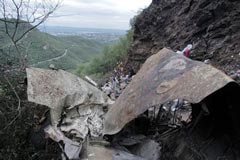 Rescue workers at the plane crash site. Rescue workers at the plane crash site.
Pakistan July 29 observed a day of mourning for the 152 people killed in the country's worst aviation disaster, as rescue workers searched for the aircraft's black box.
Investigators hope the flight data recorder will give clues to the exact cause of the July 28 crash which occurred amid heavy rain and poor visibility in the hills outside Islamabad.
The government said all possible causes would be investigated, including terrorism, bad weather and sabotage, although officials gave no indication that an attack might have been to blame.
Two Americans, an Austrian-born businessman and seven children were among the 152 people on board the Airblue flight ED 202 from the southern city of Karachi.
The Airbus 321 was coming in to land at Islamabad's Benazir Bhutto International airport when witnesses saw it flying at an unusually low altitude before hearing a deafening boom.
The plane disintegrated into a gorge between two hills, enveloped in cloud and some distance from the road, severely hampering rescue efforts and limiting visibility for helicopters hovering overhead.
"I saw a big ball of smoke and fire everywhere with big pieces of aircraft rolling down the hill," police official Haji Taj Gul said.
Health officials said DNA tests would be the only way to identify many of the remains.
"Nobody survived," Interior Minister Rehman Malik told Express TV. "It's a big tragedy. It's really a big tragedy."
Officials suggested the flight had been diverted due to bad weather, but it was unclear why the jet was flying so low and close to the Margalla Hills -- off the normal route for aircraft arriving from Karachi.
Information Minister Qamar Zaman Kaira said the black box had not yet been recovered.
|TOP|
Train Crash in India Kills More Than 60
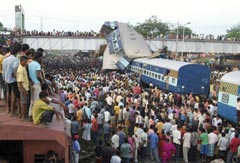 Onlookers stand at the site of a train accident that killed 61 people. Onlookers stand at the site of a train accident that killed 61 people.
A speeding express train plowed into a stationary passenger train in eastern India July 19, killing 61 people in a crash so powerful it sent the roof of one car flying onto an overpass. Officials said they could not rule out sabotage.
Residents crawled over the twisted wreckage trying desperately to free survivors before rescue workers arrived with heavy equipment to cut through the metal. Railway Minister Mamata Banerjee, who rushed to the site, raised the possibility the crash could have been another case of sabotage, two months after Maoist rebels were blamed for a derailment that killed 145 people.
“We have some doubts in our mind” about whether it was an accident, she said.
The crash happened about 2 a.m. when the Uttarbanga Express slammed into the Vananchal Express as it left the platform at Sainthia station, about 200 kilometers north of Kolkata.
The accident destroyed two passenger cars and a luggage car, turning them into a tangle of twisted metal. The passenger cars were reserved for those on the cheapest tickets and such carriages are usually packed to capacity.
The force of the crash was so intense the roof of one car flew into the air and landed on an overpass above the tracks. Local residents climbing through the debris searching for survivors were later joined by rescue workers using heavy equipment to cut through the metal.
“I was sleeping when I felt a huge jolt and heard a loud noise and then the train stopped,” passenger Lakshman Bhaumik told local television. Bhaumik survived with minor injuries.
Rescuers recovered 61 bodies from the crash site and 125 other people were injured, said Surajit Kar Purkayastha, a top police official. The two drivers of the Uttarbanga Express were among the dead, Banerjee said.
|TOP|
Cheetah Will Run Again in India
 The Cheetah The Cheetah
The cheetah, eradicated in India by hunting nearly a century ago, will run again in the country, as three sites are earmarked for its reintroduction.
The government has approved wildlife groups' recommendations of two sanctuaries in Madhya Pradesh and an area in Rajasthan as potential homes.
The government will spend 30 million rupees to restore these sites before the animals are imported.
The plan is to import the cats from Africa, Iran and the Middle East.
Kuno Palpur and Nauradehi wildlife sanctuaries in Madhya Pradesh and Shahgarh area in Jaisalmer in Rajasthan have been selected as the sites to house the animals.
Environment and Forests Minister Jairam Ramesh said the reintroduction of the world's fastest land animal would "restore the grasslands" of India.
Wildlife experts say the two sanctuaries in Madhya Pradesh had the capacity to accommodate nearly 80 cheetahs, although 23 human settlements will have to moved from the one in Nauradehi.
Scores of nomadic human settlements would also have to be cleared at the site in Rajasthan.
"The return of the cheetah would make India the only country in the world to host six of the world's eight large cats and the only one to have all the large cats of Asia," M.K. Ranjitsinh of Wildlife Trust of India told the Press Trust of India news agency.
Pursued by trophy hunters and herdsmen to the brink of extinction during the Raj, the Asiatic cheetah vanished from India many decades ago.
Conservationists say less than 100 of the critically endangered subspecies remain in Iran, roaming the central deserts.
Critics of the reintroduction scheme in India say that without restoring habitat and prey base, and reducing the scope for man-animal conflict, viable cheetah populations will not flourish.
|TOP|
India's Parliament Paralyzed by Inflation Protests
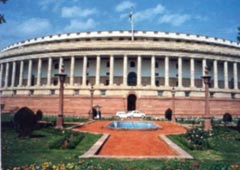 Indian Parliament Indian Parliament
India’s Parliament was paralyzed for a second day July 28 over opposition protests against inflation, with the deadlock threatening the government's reform program.
The lower house adjourned in uproar with opposition lawmakers shaking their fists in anger after the speaker rejected demands for a vote to censure the government over its "failure" to tame double-digit inflation.
The main opposition Bharatiya Janata Party has vowed not to let India's famously raucous parliament function until it debates inflation, which is running at 10.55 percent.
"We want to censure the government because the aam admi (the common man) in whose name this government came to power is now being tortured," BJP leader Sushma Swaraj said.
Prime Minister Manmohan Singh appealed to lawmakers on the opening day of this parliamentary session to allow the legislature to "function smoothly" to address "the many important pieces of legislation."
These include a plan to introduce a far-reaching indirect tax reform that would simplify India's complex tax structure and make it easier for companies to do business.
The left-leaning Congress-led government also wants to pass a nuclear liability bill that is key to giving the energy-hungry country access to U.S. nuclear technology, and other legislation that would reserve a third of all seats in the parliament for women.
The Indian central bank hiked its main interest rates for a fourth time this year in a bid to tackle inflation, which is being driven by high food costs, rising wages and a fast-expanding industrial sector.
|TOP|
$1.1B Hawk Deal
 BAE Hawk BAE Hawk
India and the United Kingdom signed a S1.1 billion Advanced Jet Trainer Hawk trainer deal during British Prime Minister David Cameron's visit in India. Cameron oversaw the signing of the agreement between BAE Systems and HAL on terms and conditions under which India would produce additional 57 of BAE's Hawks.
India had earlier purchased 66 Hawks from BAE that included 24 in fly-away condition, with 42 to be produced by HAL under license from BAE. With the new order, India has purchased 123 Hawks from Britain.
Rolls-Royce will supply engines for the Hawks.
The final terms and conditions for the contract for the BAE Hawk were signed by Guy Griffiths, group managing director international, BAE Systems, and HAL chairman Ashok Nayak, in the presence of Cameron and BAE Systems chairman Dick Oliver.
The aircraft will be manufactured under license at HAL's facilities in Bangalore and BAE Systems will provide specialist engineering services, raw materials and equipment for airframe production and the support package for the IAF and Indian Navy end users.
BAE Systems India managing director and chief executive officer Andrew Gallagher said: "The Hawk AJT fast jet training solution enables an Air Force or Navy to provide frontline pilots for even the most modern fighter aircraft such as the Eurofighter Typhoon or Sukhoi SU-30."
This year, BAe Systems and Mahindra & Mahindra launched Defense Land Systems India, a joint venture whose first product is a mine-protected vehicle designed and developed specifically for India.
With 18 customers, the Hawk has been widely exported around the world, including Australia, Canada, South Africa, Bahrain and India. UK's Royal Air Force uses the aircraft as well.
|TOP|
Bangladesh Ahead
Bangladesh has scored better than India and Nepal in UNDP's Multidimensional Poverty Index of five South Asian countries.
Among 104 countries, Bangladesh ranked 73. India ranked 74, Nepal 82, Pakistan 70, Sri Lanka 32 in the MPI released July 15.
The 10 indicators in MPI are grouped into three equally weighted dimensions -- health (child mortality and nutrition), education (years of schooling and child enrolment), and standard of living (electricity, drinking water, sanitation, flooring, cooking fuel, and assets).
The Oxford Poverty and Human Development Initiative of Oxford University and the Human Development Report Office of UNDP jointly prepared the MPI.
On Bangladesh, the report finds that 57.8 percent of its population were deprived of at least 30 percent of the set of 10 indicators in MPI, and on an average they were deprived of 50.4 percent of the indicators.
In terms of human lives, South Asia has the highest level of poverty in the world.
In Bangladesh, India, Pakistan and Nepal, the poor are deprived in case of more than half of the indicators on an average. In India, Bangladesh and Nepal deprivation in living standard is the highest contributor to poverty followed by health and education.
In education, Bangladesh is much better than India, Pakistan and Nepal. Only nine percent people of poor households have their children not attending schools in Bangladesh.
In South Asia, only Sri Lanka is ahead of Bangladesh on the education dimension, and on the health dimension Bangladesh is better than India, Pakistan and Sri Lanka.
The MPI was inspired by the work of Nobel Laureate economist Amartya Sen. Sen has argued for a multidimensional approach to poverty as well as development.
|TOP|
Fonseka: New Trial
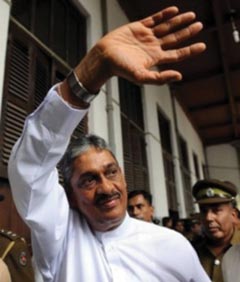 Sarath Fonseka Sarath Fonseka
Sri Lanka's former army chief and defeated presidential candidate Sarath Fonseka was brought before the Colombo High Court to answer charges of provoking violence.
Fonseka, who already faces two courts martial and two more criminal cases, was taken before a three-member "trial-at-bar" for the first time and charged, his attorney said.
"The main charge is inciting people to violence," lawyer Nalin Laduwahetti said. Some 20 witnesses will be called during the next hearing Sept. 27.
The trial-at-bar dispenses with the normal practice of trial by jury, and is normally used by the state to fast-track legal proceedings in high-profile cases. If convicted, Fonseka could be jailed for five to 20 years.
Fonseka was charged under tough emergency laws in relation to accusations he incited violence by commenting to a newspaper that surrendering rebel leaders were executed during the country's civil war, which ended in May 2009.
Fonseka maintained that the published comments -- which suggested defense secretary Gotabhaya Rakapakse, the younger brother of the president, had ordered the executions -- were in fact misquotes. Rajapakse has denied the charge.
A retired four-star general, Fonseka led the Sri Lankan army to a spectacular victory against Tamil Tiger rebels in May last year, ending the island's 37-year separatist conflict.
But he has since fallen out with the government and says the legal cases against him are politically motivated.
|TOP|
Nepal: Gay Pride
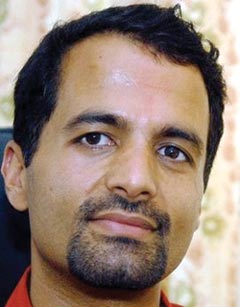 Nepal's only openly homosexual member of parliament Sunil Pant. Nepal's only openly homosexual member of parliament Sunil Pant.
Nepal will this year hold its first gay pride parade, the country's only openly homosexual member of parliament told AFP July 27.
Sunil Pant said he hopes up to 3,000 gays, lesbians, transvestites and transsexuals from Nepal and neighboring countries will march through the streets of the capital Kathmandu Aug. 25.
The date has been chosen to coincide with a centuries-old Hindu festival when Nepalese men traditionally dress up in women's clothing, and which has in recent years been adopted by Nepal's increasingly vocal gay community.
"We want to make this a truly international event," said Pant, a well-known gay rights campaigner. "Nepal has made so much progress on gay issues in the last few years, and we hope to spread hope and inspire others."
Two years ago, the country's Supreme Court ordered the government to enact laws to guarantee the rights of gays and lesbians after the Blue Diamond Society, a pressure group run by Pant, filed a petition.
Pant said the parade would feature live music and include elephants and horses dressed in bright colors, and would culminate with a candle-lit memorial service for victims of HIV and violence.
The festival of Gai Jatra, which falls on August 25, commemorates those who have died in the past year, although it is traditionally a colorful event, with young men dressing up and processing through town centers.
|TOP|
Wage Hike
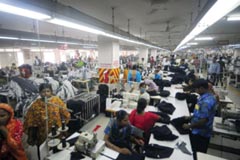 Women garment workers in a Bangladeshi facility. Women garment workers in a Bangladeshi facility.
Leading Bangladeshi trade unions said July 28 millions of garment workers would accept a proposed 80-percent increase in their minimum wage, raising hopes of an end to months of violent protests.
The government said it would raise the minimum wage from 1,662 taka, the lowest industry salary worldwide, to 3,000 taka (43 dollars) -- below the 5,000 taka demanded by some unions.
"A majority of unions have welcomed the wage board decision," said Shamsun Nahar Bhuiyan, a union representative who sat on an emergency wage board looking into the issue.
"We feel that we have scored a victory. Obviously we would have liked more, but we are aware of the realities and we don't want to destroy Bangladesh's competitiveness," she told AFP.
Nearly a dozen left-leaning unions, none of whom had representatives on the wage board, organized a protest in Dhaka, but turnout was low.
For months, Bangladesh's workers have taken to the streets for protests that have seen factories ransacked and clashes with police.
On June 22, hundreds of thousands of workers closed the key Ashulia export area, which produces for brands such as Wal-Mart, H & M and Marks & Spencer, a major blow for an industry aiming to steal contracts from Chinese competitors.
Garment manufacturers, who have staunchly resisted any significant wage increase, were locked in an emergency meeting to discuss the pay hike.
The previous minimum wage of 1,662 taka was set in 2006 after months of violent street protests.
|TOP|
Reconciliation First
World Bank Vice President for South Asia Isabel Guerrero, who ended a three-day visit to Sri Lanka pledging support to Sri Lanka's transition to a middle income country at peace, has emphasized that reconciliation is a pre-requisite for development in Sri Lanka. During her visit to Sri Lanka, Guerrero called on Sri Lanka President Mahinda Rajapaksa and key officials of the Sri Lanka Government.
"Sri Lanka, emerging from three decade-long armed conflict, is at a critical juncture of transition to a middle income country in lasting peace. The World Bank is ready to support this transition through global knowledge sharing, policy dialogue and projects. In our meeting with the President Rajapaksa, we talked about the importance of his government’s commitment to securing a lasting peace through reconciliation,” said Guerrero.
Guerrero visited the recently rehabilitated Adampan Hospital which is now operating an out patients service and the conflict-affected village of Panakattukottu in Mannar. She commended the government on its effort to resettle internally displaced persons and provide services, but also recognized the daunting challenges returnees are facing.
In Kilinochchi, she visited the Uruthirapuram village and met beneficiaries of the Cash for Work program. “I am encouraged to see that the bank-funded Cash for Work program, co-financed by the government of Australia, has been supporting returnees with an immediate income and helping them rebuild much needed community infrastructure of their choice. I hope this program continues to help them until they are able to resume their livelihoods,” said Guerrero.
|TOP|
Court Slams Martial Law
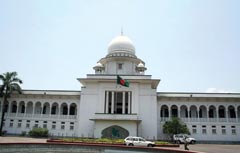 Bangladesh Supreme Court Bangladesh Supreme Court
Bangladesh's Supreme Court has denounced the declaration of martial law in the past and has sought safeguards to end “extra-constitutional adventures.”
Bangladesh underwent radical political and constitutional changes during a 15-year period between August 1975 and December 1990 when martial law was promulgated and the country had a series of military-led governments.
The Appellate Division of the Supreme Court in a landmark 186 page ruling upheld a 2005 High Court verdict that had declared the fifth amendment to the constitution illegal.
The apex court's order was placed on the Web site, The Daily Star said.
'We are putting on record our total disapproval of martial law and suspension of the constitution or any part thereof in any form,' said the apex court.
“The perpetrators of such illegalities should also be suitably punished and condemned so that in future no adventurist, no usurper, would dare to defy the people, their constitution, their government, established by them with their consent,” the apex court concluded.
It also said military rule was wrongly justified in the past, and it should not be justified in future on any ground.
“Let us bid farewell to all kinds of extra constitutional adventure forever,” it observed.
Media reports carried comments that Prime Minister Sheikh Hasina could face a political problem in acting against former military ruler Gen. (retd) H.M. Ershad, whose Jatiya Party is a key member of the alliance.
|TOP|
Pakistan: Terror Haven
Pakistan's top spy agency is coming under increased pressure over its alleged links to and sponsorship of terrorists and Taliban insurgents, as the fallout continues from a July 25 leak of tens of thousands of documents on the war in Afghanistan.
British Prime Minister David Cameron, India's foreign ministry, and the chairman of the U.S. Joint Chiefs of Staff have all expressed concerns about Pakistan's spy agency in the past two days.
Pakistan is ostensibly cooperating with the U.S. in an effort to squeeze Al Qaeda terrorists and their allies in the remote mountainous regions along the border with Afghanistan. But Pakistan's Inter-Services Intelligence has long been suspected of playing a double game, with some elements in the spy agency allegedly having links to the Taliban and other terror groups targeting India and other foreign interests.
In a speech in Bangalore, British Prime Minister David Cameron "came close" to endorsing India's view that Pakistani authorities "have a hand in the terror," according to the Guardian.
"That is why this relationship is important. It should be a relationship based on a very clear message: that it is not right to have any relationship with groups that are promoting terror. Democratic states that want to be part of the developed world cannot do that. The message to Pakistan from the US and the UK is very clear on that point," Cameron said.
India's external affairs ministry criticized Pakistan over allegations in WikiLeaks documents that Pakistan's ISI has secretly armed, trained, and financed the Afghan Taliban insurgency since 2004. India's Economics Times reports the WikiLeaks files include reports that the ISI had plotted attacks on Indian interests in Afghanistan, including its consulate in Jalalabad, and that the agency offered $15,000 to $30,000 for the assassination of Indian road workers.
|TOP|
Clash in Kashmir
Government forces fired warning shots and tear gas to quell protests against Indian rule that erupted in several towns in restive Kashmir, police said.
Protests broke out in several neighbourhoods in Anantnag, a town south of Kashmir's main city Srinagar, after police detained at least eight people for participating in recent anti-India street protests, said a police officer on condition of anonymity as he was not authorized to speak to reporters.
Police fired tear gas and used batons to disperse the protests, the officer said.
The region has been under curfew for most part of the last six weeks as anti-India street protests and clashes surged. Residents say government forces have killed at least 17 people in that period, and local authorities have asked two retired judges to investigate the deaths.
The recent tension in the Himalayan region — divided between India and Pakistan and claimed by both — is reminiscent of the late 1980s, when protests against New Delhi's rule sparked an armed conflict. More than 68,000 people have been killed, mostly civilians, in the conflict.
Clashes also erupted between rock-throwing protesters and troops in the northern towns of Sopore and Baramulla.
The police official said troops in those towns also fired warning shots and tear gas to chase away demonstrators who chanted "Go India, go back" and "We want freedom." At least nine protesters were hurt in the clashes, he said.
There were also reports of protests and sit-ins in several other places across the region.
|TOP|
Nepal, India Pact
Nepal and India inked a key pact to curb illegal trade in animal parts and other conservation initiatives to boost wildlife in the two neighboring states.
Nepal signed a Memorandum of Understanding with India at the Ministry of Forest and Soil Conservation to combat illegal trade in animal parts.
"After the MoU with China in June, we were working hard to enter into a similar agreement with India and the time has finally come for that," Forest Minister Deepak Bohara was quoted as saying by the myrepublica online, the news website of Republica daily.
The MoU was signed by Satya Prakash Yadav, deputy inspector general of National Tiger Conservation Authority, Ministry of Environment and Forests of India, and Nepal’s director general of national parks and wildlife conservation, Gopal Prasad Upadhyay, the report said.
Nepal has stepped up steps to combat wildlife conservation and illegal trade in animal parts, which are treasured for commercial and medicinal purpose in China.
There are 13 tiger range countries in the world including Nepal, India, China and Myanmar. The tiger range countries have been working together to conserve the endangered wild animal tiger, to double the number or around 7,000 by next Year for Tiger 2022.
Bohara said Nepal is committed to double the tiger population to 250 by the year 2022. The government is committed to control poaching, increase tiger habitat and prey animals with a view to double the tiger population in the next 12 years, he said..
|TOP|
|
|
|
|
|
|